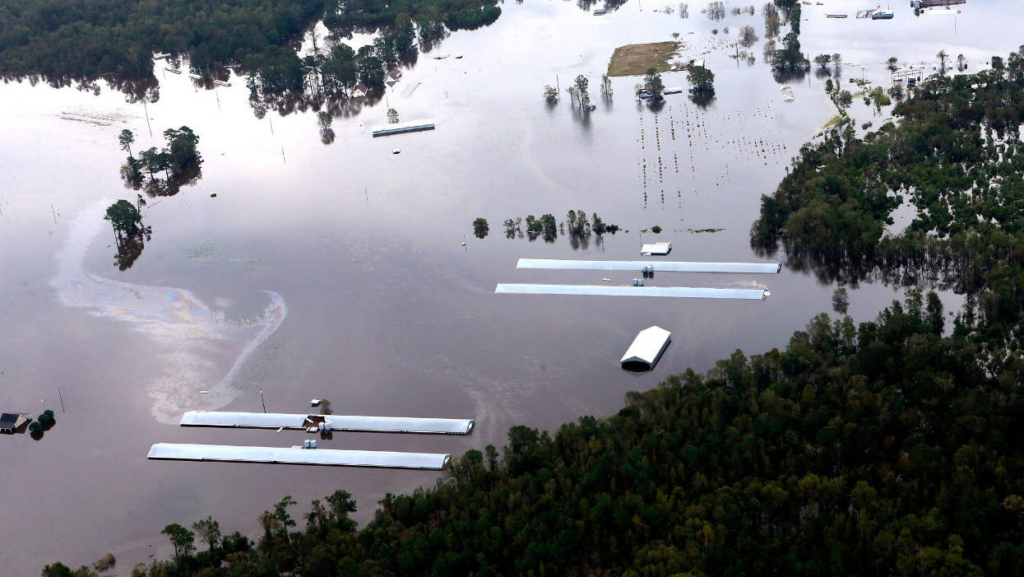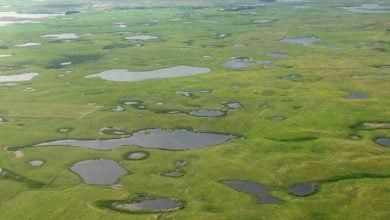
Working people in the eastern part of North Carolina are trying to pick up the pieces of their lives in the wake of hurricanes Florence and Michael. For many in Sampson and Duplin counties, the heart of hog country in North Carolina, that task seems insurmountable.
A powerful combination of profit-driven factory pig farming and extreme weather have created a hellscape for residents unlucky enough to live close to industrial swine farms and slaughterhouses. The storms have caused giant open lagoons of hog waste to overflow, flooding homes, churches, schools and neighborhoods with millions of gallons of pig excrement and environmental wastes. Many of the residents in these poor and working class rural areas are stranded, with nowhere to go.
‘Environmental nightmare unleashed’
In a phone interview, Naaema Muhammad, Director of the North Carolina Environmental Justice Network, explained to this reporter that the storms unleashed an “environmental nightmare in the southeastern part of the state.” The North Carolina Environmental Justice Network is an organization dedicated to highlighting the intersections between capitalist exploitation, racism and global climate threats.

Muhammed described a potent mixture of coal ash, pig feces, human waste and chemicals that overflowed from two treatment facilities to stand among the community’s churches and schools. Speaking with a co-worker that traveled through the area to help her children living on the coast, she described an overwhelming and inescapable carrion smell that enveloped the area. With a look of disgust, she said she “almost turned around,” it was so bad.
Additionally, according to Kemp Burdette, a riverkeeper and advocate, Hurricane Florence caused seven million gallons of hog waste to overflow two lagoons and entered the tributaries to the South River and the Northeast Cape Fear River. More than a hundred and thirty of the state’s roughly four thousand hog-waste lagoons were compromised, or close to being compromised, by the floodwaters.
Storms compounded existing problems
Muhammad highlighted that even without the recent hurricane, these farms and their waste lagoons cause “daily problems for people living nearby.” Just living next to one of the 4,000 hog waste lagoons is enough to make people sick due to the high amounts of ammonia and methane that evaporate from the waste lagoons.
Some of the documented effects of simply breathing air near these pig farms include elevated blood pressure, asthma, reduced lung capacity and other respiratory ailments, she said. These reservoirs have also contaminated the water the residents rely on, requiring them to purchase and consume bottled water instead of the water in their wells. Due to the prohibitive cost, many still use this toxic-laden water for bathing and cleaning, while drinking the bottled water.
On top of this, some of the farms are now disposing of hog waste by spraying it on agricultural fields. But the airborne fecal matter is also hazardous. People living next to these fields are surrounded with the toxic vapor and the smell of pig excrement, and they say they can no longer sit on their porches, or hang their clothes out to dry. Local resident Terry “Pap” Adams said of the fecal vapor, “you can feel it on your clothes.” Speaking as if it to describe a change the weather, he added, “you could feel it, like a misting rain. But wasn’t misting rain. It was that stuff.” Describing the overwhelming smell of pig feces filling the air, he continued, “When the wind is right, you get it – ain’t nothing you can do about it.”
According to Muhammed, contributing to this community of working people’s poor health outcomes is a lack of adequate health care available to residents. Even those lucky enough to have insurance have difficulty accessing hospitals and doctor’s offices because of the area’s lack of public transportation and the long distances needed to travel to there.
Seventy-seven pigs per person
The production of pork has increased significantly over the last 30 years, with the state catapulting from seventh in pork production in 1986 to second in 2017, and generating $2.9 billion in revenue. The 9 million pigs raised on these giant farms enjoy a miserable existence, standing from birth on concrete slabs with their feet never once touching the ground. They defecate where they stand and their excrement is carried out by a series of pipes that are then pumped into the waste lagoons. Such a large number of animals creates millions of tons of fecal matter.
While there are about as many pigs as there are people in the state of North Carolina, the state’s hogs are not evenly distributed, with the majority residing in just two poor counties. So prolific is the industry that in Duplin and Sampson there are 77 pigs for every person in either county.
‘The U.S. South is the Third World’
Located in some of the most impoverished areas in the entire state, these factory farms disproportionately affect poor, Black, Latino, and Native America communities. These indignities are just the newest example in a long line that traces the whole history of colonialism. Mohammed told this reporter, “People like to talk about the Third World. Well the U.S. South is the Third World.” Listening to her describe what she has seen on the ground, it is difficult to argue.
Corporate pigs at the trough
Most of the pig farms are owned by or contracted with Smithfield Foods. The company has the money to process the waste turning it into solids that can be sold as fertilizer, and the liquids reprocessed. But it has refused to do this because the cost of cleanup is paid for by state and local governments. Lack of accountability allowed these manure reservoirs to multiply exponentially, and with them the cost to the communities.
Politicians help companies poison environment
Local politicians are also complicit. The massive and reckless growth in the hog industry, was made possible by legislation that favors profits over people. Democratic state legislator Wendell Murphy, known to the North Carolina News and Observer as “Boss Hog,” pushed forward a series of laws during the early 1990s that blunted air and water pollution regulations associated with the industry, and also provided tax subsidies to the pork farms. And in 2012, North Carolina passed a law actually prohibiting the use of climate science in certain state planning!
Mutual aid network brings assistance
Despite the sea of filth that has submerged their homes, many of the people whose homes were destroyed by the fecal reservoir overflow in these areas have no place to go. Temporary shelters are being shut down, hotels no longer have vacancies, and the last refuge for many, a disaster-relief house has been closed. It is clear that the state is ill-prepared to deal with a crisis of this scale, especially after decades of budget slashing by Democrats and Republicans.
Rather than wait for the state to help the community, the North Carolina Environmental Justice Network, as part a coalition called Blueprint NC, have set up a mutual aid network to distribute much-needed supplies to those suffering in southeastern North Carolina. The group is bringing these provisions from a warehouse near the affected areas and going directly into these communities. Focusing on providing the necessities of life like food, water and tarps to help patch homes, the groups are also conducting an educational campaign to help residents learn how to properly clean contaminants and remove mold where they can.
As capitalism continues to push the boundaries of the environment, these catastrophes will likely become more common, but so to should the response. While holding the state and the corporations accountable, the people will need to come together to provide services for each other, not for profit, but out a sense of shared community.






